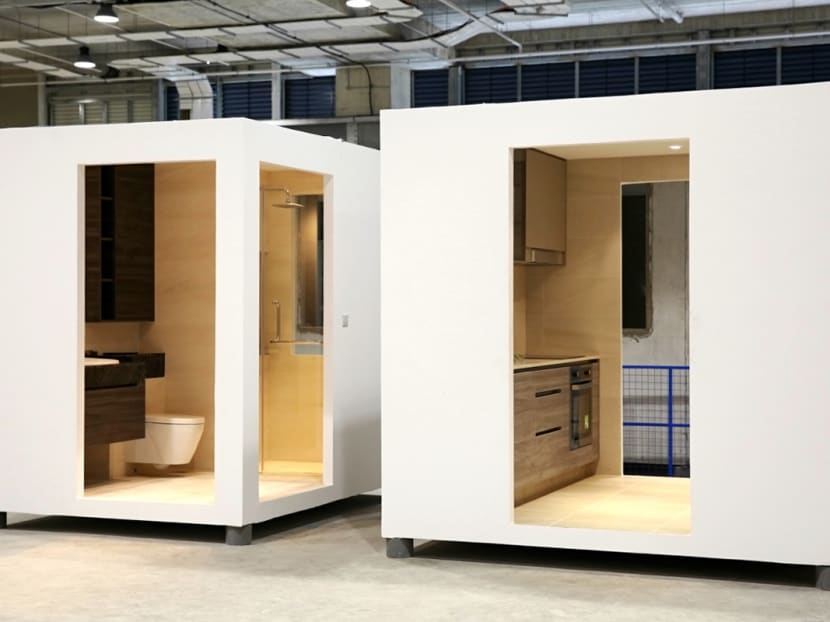Forecast on tenders with prefabrication technologies launched; construction ITM to be rolled out
SINGAPORE — Looking to facilitate the transformation of the construction industry, some 60 tenders requiring prefabrication technologies will be put up from now till the end of next year, several times more than what it was just four years ago, said finance minister Heng Swee Keat.

A prefabricated bathroom (left) and kitchen unit on display at the Greyform Building on Tuesday (Oct 3). It is the second Integrated Construction and Prefabricated Hub (ICPH) awarded under a public tender by the Building and Construction Authority (BCA). Photo: Nuria Ling/TODAY
SINGAPORE — Looking to facilitate the transformation of the construction industry, some 60 tenders requiring prefabrication technologies will be put up from now till the end of next year, several times more than what it was just four years ago, said finance minister Heng Swee Keat.
Stressing the critical role the construction sector plays in the Republic’s future economy, the minister also shared that the industry transformation map (ITM) for the sector will be unveiled later this month at the Singapore Construction Productivity Week.
“There are challenges in the construction sector, which are being felt worldwide. But new technologies and sustainability and resource considerations are providing impetus for productivity improvements,” said Mr Heng on Tuesday (Oct 3). He was making the speech on the back of the opening of Greyform Building owned by construction precast and prefabricated solutions company Greyform. The firm is a member of Straits Construction Group.
At the event, Mr Heng said the Building and Construction Authoriity (BCA) will start to provide a forecast of the number of tenders with specified design for manufacturing and assembly (DfMA) technologies to be called in each year. The move will help firms have the runway to plan ahead how best to deploy resources, as well as to seek out partners and collaborators. The 60 projected tenders are to be called for public sector projects and government land sale sites. Compared to four years ago, there were fewer than 10 such DfMA tenders a year.
DfMA technologies means designing for labour-efficient construction, with as much construction works done off-site as possible. The forecast from BCA is available on their website from today onwards. The projects will be categorised according to the type of DfMA technology and project value.
“The growing number of firms investing in DfMA technologies will have these opportunities to look forward to. Other companies can also know where the opportunities lie ahead and make informed investment decisions,” said Mr Heng.
Another strategy to improve productivity in the construction sector is to use highly automated and digitally-integrated processes, the likes seen in integrated construction and prefabrication hubs (ICPH) such as the Greyform building.
The building is a multi-storey advanced manufacturing facility for producing prefabricated construction elements such as precast concrete components, with a high degree of automation.
At Greyform, robots automate the manufacturing of prefabricated components such as columns, beams, walls and slabs. Without the technology, workers have to manually prepare the moulds and formwork and pour concrete to produce these components on site. The workers can now work in a control room, operating machines to do the otherwise manual work for them.
DfMAs and ICPHs are critical in improving productivity in construction, as they improve labour productivity, said Mr Heng. ICPHs optimises land use by consolidating construction processes in a single facility, improves the quality of prefabricated components and help create new and higher skilled jobs that require multidisciplinary skills, he added.
Giving some details on the construction ITM, the minister said the ITM will bring together stakeholders to design and act on an integrated, targeted suite of initiatives, to raise productivity and competitiveness of the sector, thereby opening more opportunities for companies and workers.
The construction sector will continue to play a critical role in the Republic’s future economy, the minister added, as Singapore rejuvenates its city and develop growth areas such as the Jurong Lake District, and in Punggol and Woodlands.









